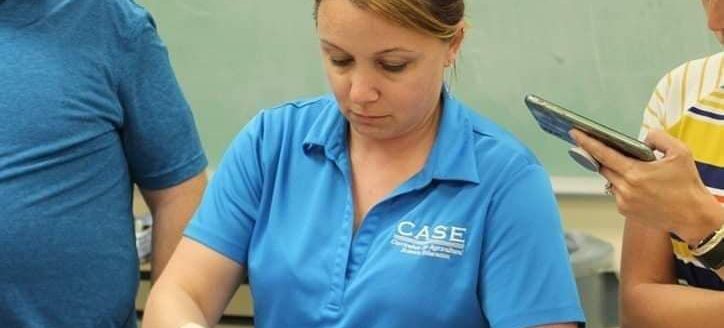Rural high school agriculture program inspires youth to pursue agriculture careers
Chris Johnston has been with Elk Valley School in Longton, Kansas, for about four years. The 1A school is small and when Johnston accepted the single teacher agricultural educator position, he was made aware the school’s agriculture program was in jeopardy.
“When they hired me, they told me you’re either going to turn this FFA program around, or you’re going to close the doors,” Johnston said.
A native of Fort Supply, Oklahoma, Johnston says his hometown has a lot in common with Longton. They are both perceived as just dots on a map and they face a lot of the same issues, such as being located in rural areas, socioeconomically depressed populations and most of the jobs in the area are agricultural. In fact, Johnston says 93% of the jobs in Elk County, Kansas, are involved in production agriculture. The problem with that is the young people often move away to larger cities in search of work, which causes the population to dwindle.
“We need the kids to come back into the industry and we need the population boost,” Johnston said. “People flock out of small places like this to Wichita or Kansas City and seldom return to their roots.”
Johnston says when he was in college at Oklahoma Panhandle State University in Goodwell, Oklahoma, he came up with an idea to immerse students back into agriculture and restore some of the laborers to the agriculture industry.
“Right now, if people do find help, the kids can hardly use a pair of pliers,” Johnston explained. “I wondered to myself what we are doing wrong with our schooling and these programs we’re teaching.”
Johnston says when he was hired, the school board already had a vision to ramp up their agricultural education program. When he shared his ideas, the school and community brainstormed and came up with a program they would later call The Ag Experience. The program was designed to combine hands-on learning experiences for students to develop a love and understanding of how they could be successful with agricultural careers and at the same time keep small schools viable in rural areas. However, before this project could gain enough steam, Johnston first had to save the Elk Valley FFA chapter.
Cranking up the fire in the FFA program
From the first day Johnston walked into his classroom, he decided to take the students who were already in the FFA chapter and get them super involved. Everyone picked a Supervised Agricultural Experience project and once he started taking them to contests and livestock shows they instantly took to it.
“By the end of the first semester, when the kids re-enrolled for classes, my class roster doubled,” Johnson said. “Now I have all but three of the kids in high school enrolled in my classes and the only reason they are not in my class is because of scheduling conflicts.”
Over time, the agriculture program kept building itself back with Johnson at the helm, but he says he lets the students drive the program with their interest levels and what they want to learn about. Once the FFA chapter was reestablished, the school started implementing ideas for The Ag Experience, and so far it has been a giant success. Students who might not have been involved with agriculture are gravitating toward it and Johnson is finding new and innovative ways to provide the best education to the students he teaches.
Johnston has even recruited students for his programs by allowing parents of homeschooled students to bring their children to his agriculture classes. Parents enroll their children as half-time students and are still allowed to participate in FFA programs that build leadership skills, life skills and help them discover career opportunities.
“It’s just one of those things that just grows every day,” he said. “The Ag Experience is a new program and it’s never been done before, so we’re tweaking it and changing it all the time.”
Right now, 57 students rotate through his classroom daily, including middle schoolers who are not officially FFA members. His FFA chapter consists of 37 FFA members and his school farm is comprised of about 15 to 20 acres. Johnston houses SAE and livestock projects and chapter-owned livestock for teaching purposes on the school farm so students can learn by doing.
“I want them to have a well-rounded education, not only in agriculture, but have some real world life experiences,” Johnston said. “This way if they do choose to go straight into the industry, they have those skills that our industry demands.”
Thinking out of the box
For schools like Elk Valley, finding inventive methods of keeping the school alive for the benefit of families in rural areas and the good of small communities is a must. The school even purchased an old hotel to repurpose as a dormitory for students involved in the Ag Experience who are from out of town, district or even out of state.
“It’s not a charter school, but it’s like a destination school,” Johnston explained. “Our primary focus will be the ag program. We co-op sports with another school, but we are in the process of bringing sports back to Longton, but it may be take some time.”
Elk Valley is on a four-day school week, so students come onto campus on Monday night or early Tuesday morning, go through classes Tuesday through Friday and will stay in the hotel during the week. Currently the students involved in the program are semi-local, and at the most travel 45 miles to the school.
As of Aug. 1 the housing system will be open and the Ag Experience will welcome its first wave of attendees to the dormitory facility. This year is cost-free, but next year the program plans to offer scholarships for students to attend. Johnson says he looks for individuals who will have the right attitude, mindset and students who will be positively impacted by the program.
“We really want for kids come over and tour the facilities and talk with us before they apply,” Johnston said. “I don’t necessarily think a senior, on their way out the door is the best case scenario. We’re really looking for sophomore or freshman aged kids. I want these kids to get the full scope experience from beginning to end so as they flow through, they hit our articulation agreements we have with some junior colleges and can fall right into some post-secondary programs or go straight into the industry as soon as they complete our program.”
Johnson truly takes the FFA Motto—Learning to Do, Doing to Learn, Earning to Live, Living to Serve—literally when educating and mentoring his students.
“My main goal as an educator—no matter what I’m doing—is when kids leave my classroom or school farm, is I want them to have learned something, especially about citizenship, literacy and advocacy in the ag industry,” Johnson said. “We’re in a time right now where we really blur the lines between literacy and advocacy and I really try to make a point of that with my students. They need to be able to go out and advocate for agriculture and teach others what agriculture is and really hit that literacy side.”
Additionally, Johnson says he believes FFA programs need to return to the bare bones of what agriculture is and teach the fundamentals.
“I feel we get too far disconnected from what the nuts and bolts of agriculture really are and that we need to return to our roots a little bit and teach what it really takes for production to happen, whether it is what happens to that bushel of wheat when it comes out of the field or where that steer goes once he leaves the sale barn.”
A line in the official FFA opening ceremonies sums up The Ag Experience best when the FFA president asks the FFA members, “Why are we here? To practice brotherhood, honor agricultural opportunities and responsibilities and develop those qualities of leadership which an FFA member should possess.”
To learn more about The Ag Experience or apply, visit www.theagexperience.com.
Lacey Newlin can be reached at 580-748-1892 or [email protected].



